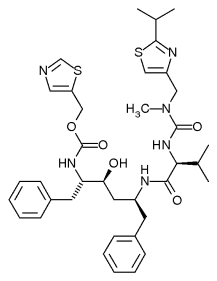Ritonavir soft-gelatin capsules are white and imprinted with the Abbott corporate logo on one side. Ritonavir is also available in a liquid formulation.
"We know from Abbott's pivotal licensing study that if you give ritonavir (Norvir) to people with a CD4 count below 100 cells/[mm.sup.3] who are already on one or two nucleoside analogues, the rate of AIDS illness and death is ... halved."
--Mark Harrington, a New York AIDS activist, on one of the few clinical endpoint studies for an anti-HIV drug
"I would rather die."
--a constituent of The Center for AIDS on the choice between survival and the use of liquid ritonavir
Also known as: RTV, ABT-358
Background and description. Ritonavir is a protease inhibitor. The US Food and Drug Administration (FDA) approved ritonavir in March 1996. Ritonavir is indicated in combination with other antiretrovirals for the treatment of HIV infection. The drug is manufactured by Abbott Laboratories.
Guidelines classification. When used as the only protease inhibitor in a regimen, the Panel on Clinical Practices for the Treatment of HIV Infection classifies ritonavir as an "alternative;" however, the panel classifies a reduced close of ritonavir in combination with saquinavir (Fortovase) as "strongly recommended."
Dose. If used as the only protease inhibitor in a regimen, the recommended dose of ritonavir is 600 mg (six 100 mg capsules) twice a day. When used in combination with saquinavir, the recommended dose of ritonavir is 400 mg (four 100 mg capsules) twice a day.
Food restrictions. Food improves ritonavir's pharmacokinetics somewhat and makes the drug more tolerable; however, a patient may take ritonavir without food.
Storage. Abbott recommends that patients store ritonavir capsules in the refrigerator; however, refrigeration is not necessary if the capsules are used within 30 days, protected from light and kept at a temperature less than 77 [degrees] F Ritonavir solution should be kept at room temperature and not refrigerated.
Side effects and toxicity. Side effects most commonly produced by ritonavir include asthenia (weakness), nausea, diarrhea, vomiting, anorexia, abdominal pain, taste perversion and circumoral paresthesia (numbness around the mouth). Metabolic (lipid and glucose) and morphologic (fat accumulation and fat atrophy) abnormalities have been associated with protease inhibitors in general.
Drug interactions. When mixed with ritonavir, certain antihistamines, sedative hypnotics and antiarrhythmics may produce serious or life-threatening reactions. The following drugs should not be combined with ritonavir: bepridil (Vascor), amiodarone (Cordarone), flecainide (Tambocor), propafenone (Rythmol), quinidine (Quinidex), simvastatin (Zocor), lovastatin (Mevacor), cisapride (Propulsid), clozapine (Clozaril), midazolam (Versed), triazolam (Halcion), dihydroergotamine (DHE 45) and ergotamine (Cafergot). Lipid-lowering drugs such as atorvastatin (Lipitor), pravastatin (Pravachol) or fluvastatin (Lescol) should be used with caution. When administered concomitantly with ritonavir, the dose of rifabutin (Mycobutin) should be reduced to 150 mg once daily. No more than 200 mg daily of ketoconazole (Nizoral) should be given to a patient receiving ritonavir. Levels of methadone (Dolophine) are reduced in the presence of ritonavir and may require dose adjustment. Since ritonavir decreases the level of oral contraceptives when the two are co-administered, an additional or alternative method of birth control should be used.
Resistance and cross-resistance. Mutations at positions 82, 84 and 54 are associated with resistance to ritonavir. High-level cross-resistance between ritonavir and other protease inhibitors has been observed.
Clinical data. Abbott 247 randomized 1090 treatment experienced patients with a mean baseline CD4 cell count of 32 cells/[mm.sup.3] to add ritonavir or placebo to each patient's baseline antiviral regimen. The incidence of disease progression or death during the double-blind phase of the study was 26% for patients receiving ritonavir versus 42% for patients receiving placebo. This difference was statistically significant. At week 24, patients randomized to the ritonavir arm of the study had a mean CD4 T cell increase of approximately 50 cells/[mm.sup.3] and a mean decrease in viral load of approximately 0.6 log.
Ritonavir was the first protease inhibitor to demonstrate a decrease in disease progression or death when administered to patients with advanced HIV infection. Although it is one of the most potent protease inhibitors on the market, the drug's side effect profile prevents its widespread use as the anchor in a 3-drug regimen. Ritonavir's efficacy in combination with saquinavir is well-established, and studies are now underway to characterize the potential benefits of combining ritonavir with other protease inhibitors, including indinavir (Crixivan) and amprenavir (Agenerase).
Patient assistance. Abbott Laboratories provides a patient assistance program. For more information, call 800.659.9050.
COPYRIGHT 2000 The Center for AIDS: Hope & Remembrance Project
COPYRIGHT 2000 Gale Group



